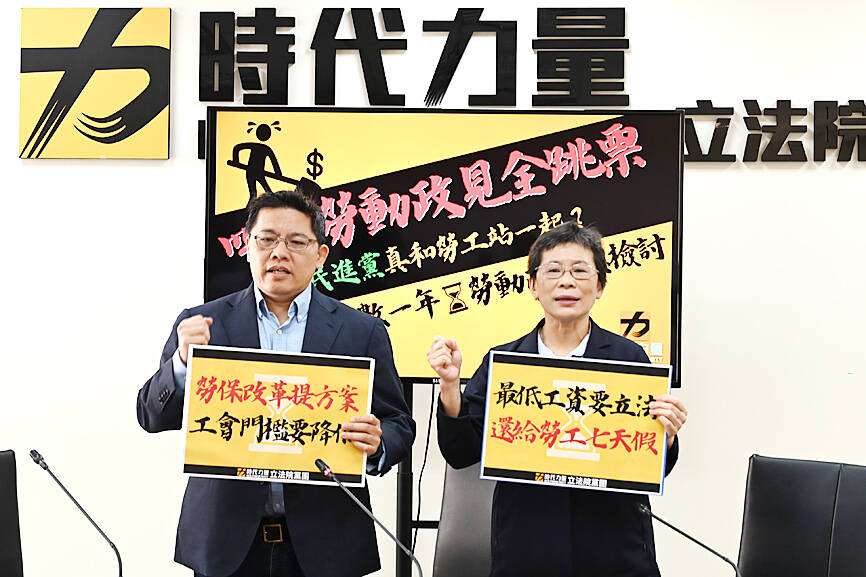The Democratic Progressive Party (DPP) has failed to deliver on its labor policy-related promises, the New Power Party (NPP) caucus said on Friday, urging the government to act swiftly to put its plans into practice.
The caucus was referring to President Tsai Ing-wen’s (蔡英文) promises to launch a labor pension reform, lower union formation thresholds, draft a minimum wage act and a national holiday act, define the minimum living standard for workers, and restore seven national holidays that people might have to work without compensatory leave or extra pay after an amendment to the Labor Standards Act (勞動基準法) was passed in 2016.
The amendment guarantees that people have compensation days for work on weekends, but did not set rules for work on national holidays. The arrangement sparked protests from workers and labor groups.

Photo: Wang Yi-sung, Taipei Times
NPP caucus whip Chiu Hsien-chih (邱顯智) said that despite Tsai and Minister of Labor Hsu Ming-chun (許銘春) calling labor reform urgent, the administration has not taken any meaningful steps to that end in Tsai’s seven years in office.
The Labor Insurance Fund is at risk of becoming insolvent and no amount of subsidies would be enough to address the issue, Chiu said.
Even DPP lawmakers have said that the government owes tens of millions of Taiwanese a reform of the fund, he added.
Chiu said that Tsai pledged to increase the union coverage rate among workers, but the membership rate remains low at about 8 percent.
This is because the Labor Union Act (工會法) sets excessive standards that prevent employees at 97 percent of all companies from forming unions, he added.
The NPP has received complaints about the Ministry of Labor stonewalling workers’ attempts to establish a national union, Chiu said.
The ministry is hostile toward workers, even though it claims to be the workers’ greatest friend, he added.
NPP Legislator Chen Jiau-hua (陳椒華) focused her criticism on Vice President William Lai (賴清德), saying that despite his claim that the “DPP has always stood shoulder to shoulder with workers,” the Cabinet failed to draft a minimum wage act when Lai served as premier from 2017 to 2019.
Instead, the Cabinet drafted an amendment to the Labor Standards Act that made the situation worse, increasing total work hours and reducing the time between shifts, while refusing to reinstate rules that would guarantee workers compensation days or extra pay for work on national holidays.

Taiwan has received more than US$70 million in royalties as of the end of last year from developing the F-16V jet as countries worldwide purchase or upgrade to this popular model, government and military officials said on Saturday. Taiwan funded the development of the F-16V jet and ended up the sole investor as other countries withdrew from the program. Now the F-16V is increasingly popular and countries must pay Taiwan a percentage in royalties when they purchase new F-16V aircraft or upgrade older F-16 models. The next five years are expected to be the peak for these royalties, with Taiwan potentially earning

STAY IN YOUR LANE: As the US and Israel attack Iran, the ministry has warned China not to overstep by including Taiwanese citizens in its evacuation orders The Ministry of Foreign Affairs (MOFA) yesterday rebuked a statement by China’s embassy in Israel that it would evacuate Taiwanese holders of Chinese travel documents from Israel amid the latter’s escalating conflict with Iran. Tensions have risen across the Middle East in the wake of US and Israeli airstrikes on Iran beginning Saturday. China subsequently issued an evacuation notice for its citizens. In a news release, the Chinese embassy in Israel said holders of “Taiwan compatriot permits (台胞證)” issued to Taiwanese nationals by Chinese authorities for travel to China — could register for evacuation to Egypt. In Taipei, the ministry yesterday said Taiwan

‘LIKE-MINDED PARTNER’: Tako van Popta said it would be inappropriate to delay signing the deal with Taiwan because of China, adding he would promote the issue Canadian senators have stressed Taiwan’s importance for international trade and expressed enthusiasm for ensuring the Taiwan-Canada trade cooperation framework agreement is implemented this year. Representative to Canada Harry Tseng (曾厚仁) in an interview with the Central News Agency (CNA) said he was increasingly uneasy about Ottawa’s delays in signing the agreement, especially as Ottawa has warmed toward Beijing. There are “no negotiations left. Not only [is it] initialed, we have three versions of the text ready: English, French and Mandarin,” Tseng said. “That tells you how close we are to the final signature.” Tseng said that he hoped Canadian Prime Minister Mark Carney

POSITIVE DEVELOPMENT: Japan and the US are expected to hold in-depth discussions on Taiwan-related issues during the meeting next month, Japanese sources said The holding of a Japan-US leaders’ meeting ahead of US President Donald Trump’s visit to China is positive news for Taiwan, former Japan-Taiwan Exchange Association representative Hiroyasu Izumi said yesterday. After the Liberal Democratic Party’s landslide victory in Japan’s House of Representatives election, Japanese Prime Minister Sanae Takaichi is scheduled to visit the US next month, where she is to meet with Trump ahead of the US president’s planned visit to China from March 31 to April 2 for a meeting with Chinese President Xi Jinping (習近平). Japan and the US are expected to hold in-depth discussions on Taiwan-related issues during the